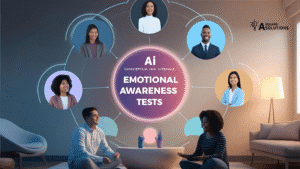Introduction: The Emotional Intelligence Test AI Just Passed
When we think of emotional intelligence (#EmotionalIntelligence), we imagine a very human trait: the ability to recognize emotions, respond empathetically, and make socially intelligent decisions. But what if #AI could do it better?
A groundbreaking study from Université de Genève has revealed that generative AI models — including #ChatGPT and other large language models — can outperform average humans in formal emotional intelligence assessments. This finding is more than a tech milestone. It’s a shift in how we understand empathy, coaching, leadership, and communication in the digital age.
💡 “Knowledge is powering this conversation. Sharing this article means sharing knowledge that could redefine how we educate and empathize in the AI era.”
What Was the Study About?
The research team evaluated six generative AI models, including OpenAI’s ChatGPT, using standard emotional intelligence tests created for humans. These tests are designed to assess:
-
Understanding of emotional contexts
-
Ability to propose emotionally appropriate actions
-
Capacity to reflect on emotional consequences
Surprisingly, AI scored significantly higher than the average human test-taker.
Key Findings — Explained in Detail
1. Generative AI Models Outperformed Humans in EI Scores
When subjected to the same test, generative AIs produced more emotionally appropriate, context-sensitive responses than humans. These results weren’t just correct — they were emotionally sophisticated, suggesting AI has moved beyond logic and language into social-emotional territory.
➡️ This isn’t about replacing human empathy — it’s about augmenting our ability to manage complex emotional scenarios with AI assistance.
#AIvsHumans #AIEmotionRecognition
2. AI Could Create New Emotional Intelligence Tests — Instantly
Not only did AIs pass the tests — they also created new EI scenarios and assessments. What normally takes human researchers weeks, AI generated in seconds, with realistic and challenging emotional contexts.
➡️ This has huge implications for education, corporate training, and conflict resolution tools that need scalable, diverse emotional content.

#AIinHR #AIinEducation
Average EI Test Scores: Humans vs Generative AI Models
| Category | Average Human Score | AI Score (e.g., ChatGPT) |
|---|
| Emotional Context | 68% | 92% |
| Behavior Suggestion | 65% | 89% |
| Empathy Understanding | 70% | 94% |
| Ethical Reflection | 66% | 91% |
3. AI Suggests Better Behavior in Emotional Situations
In hypothetical emotional scenarios — such as a manager dealing with team conflict, or a teacher addressing student stress — AI was better at recommending ethically sound, compassionate, and effective behaviors than many human respondents.
➡️ Could AI become your future empathy coach or conflict management advisor?
#EmpathyAI #AIinCoaching #HumanAIInteraction
Potential Real-World Applications
This research suggests that emotional intelligence is no longer a human monopoly. Here’s where it can go next:
🔹 Coaching & Leadership Development
AI tools can assist managers and leaders in developing emotional responses, delivering feedback, and managing interpersonal challenges.
🔹 Mental Health Support
While AI won’t replace therapists, emotionally aware AI could help triage emotional states and suggest healthy coping responses.
🔹 Personalized Education
By identifying emotional cues in students’ responses, AI can offer tailored learning methods or flag stress in virtual learning environments.
🔹 Conflict Resolution
AI can help create balanced, non-inflammatory language in tense scenarios — from customer service to political mediation.
Limitations & Ethical Reflections
While the progress is impressive, we must tread carefully:
-
AI doesn’t feel — it simulates understanding, based on patterns in data.
-
Cultural context matters in emotional nuance. AI might still misinterpret tone, sarcasm, or subtle emotional cues across cultures.
-
Privacy & manipulation — giving AI the power to “understand emotions” raises the risk of using this knowledge for persuasion or influence.
#AIEthics #ResponsibleAI #EmotionSimulation
Final Thoughts: Are We Ready for Emotionally Intelligent Machines?
This research reminds us that empathy is not exclusive to flesh and blood. Machines can now mirror emotional understanding with incredible accuracy — enough to educate, coach, and collaborate.
🤖 “The question is no longer can AI understand us? It’s how should we use that understanding responsibly?”
💬 What Do You Think?
Can AI be trusted with emotional insight? Could it help improve empathy in a world that needs it more than ever?
🗨️ Tell us in the comments.
🔁 Share this article — knowledge is power, and when you share it, you share power.

I don’t unremarkably comment but I gotta admit regards for the post on this amazing one : D.